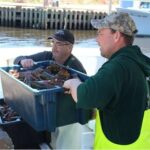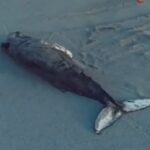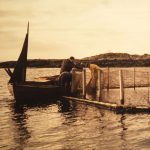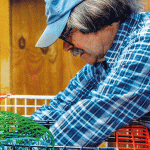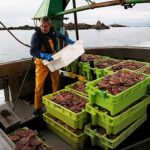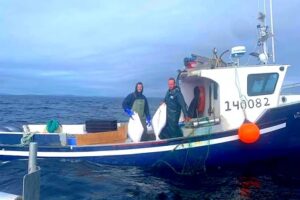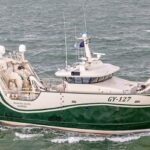Daily Archives: January 15, 2017
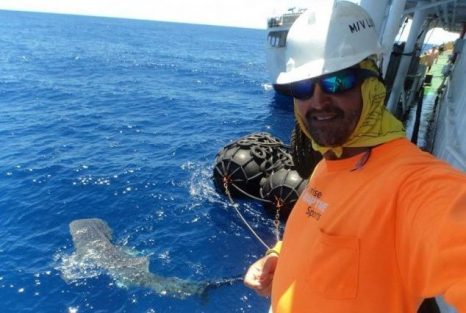
The Mysterious Disappearance of Fisheries Observer Keith Davis
A little over a year before Keith Davis disappeared at sea, he sent an ominous email to friends. In it, he linked to a video that shows four men being shot to death while they cling to debris in the ocean. After the gunshots ring out and blood spills into the water, the camera pans to the boat, reportedly a tuna fishing vessel from Taiwan, where men are laughing and posing for photos. The YouTube video describes the victims as Fijian, killed just beyond Fijian waters. Other commenters claim they were Somali pirates whose attempts at hijacking the tuna vessel off the coast of Somalia backfired. “One way or another, the video depicts murder,” wrote Davis. The 40-year-old was a fisheries observer—a member of a little-known profession tasked with traveling aboard the boats used to fish the world’s oceans to monitor and collect data from the catches—and spent much of his time far from shore. The nature of his work made him an outsider among captain and crew: a tiny, isolated speck in a vast ocean. Davis often confided to friends about his increasing unease over the lack of law enforcement at sea and the mounting dangers facing both fishermen and the observers who monitor them. The video is an extreme example of what sometimes goes on in the middle of the ocean, wrote Davis. “But know that there is other awful stuff that happens out there that goes unpublished.” Read the story here 15:04
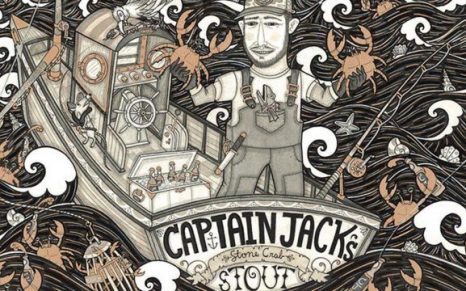
Coppertail releases beer that yes, seriously, has stone crab in it
Offering further evidence that there’s nothing craft brewers won’t incorporate into a beer, Tampa’s own Coppertail Brewing marked Friday the 13th with the release of its Captain Jack’s Stone Crab Stout, an “unconventionally flavored” brew that pays tribute to both Florida’s annual stone crab harvesting season and the anglers that brave the slightly colder winter waves in search of those delicious crustacean claws. And yeah, Captain Jack’s is literally made with stone crabs. What’s more, a portion of sales proceeds will be donated to the Florida Keys Commercial Fisherman’s Association “to promote sustainable fishing, and to help preserve the way of life of Florida fishermen.” Read the story here 12:16
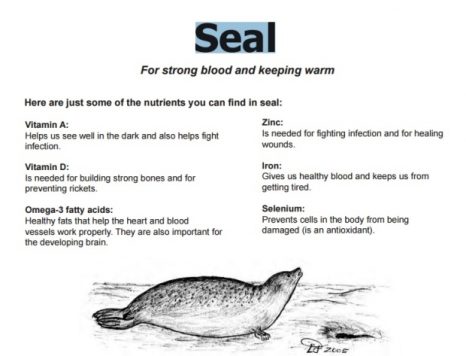
Seal meat, a Natural Sustainable Resource – Questions for those who decry seal meat and other Indigenous foods
When a Vancouver chef put seal on the menu this week he attracted some negative attention — but in Nunavut icy chunks of raw whale blubber and seal meat are common fare. Seals are not endangered, so why the aversion to seal dishes in urban Canada? It seems people are still haunted by images from the 1980s of white-furred seal pups clubbed on blood-soaked ice — images that led to cries of inhumane kill practices. These days, the seal slaughter is considered to be as humane as any food-source animal. Seals are shot and ensured to be dead. And Canada now requires mandatory training for sealers to ensure the hunt is humane. “We welcomed the news today that the popular Vancouver restaurant Edible Canada will be offering its own culinary take on East Coast seal meat in a new dish they call seal pappardelle,” said the Canadian Sealers Association. But there are questions for those who decry seal meat and other Indigenous country foods. Read the article here 10:09
Fishermen, consumers rallying to fight petition calling for shrimp trawl restrictions
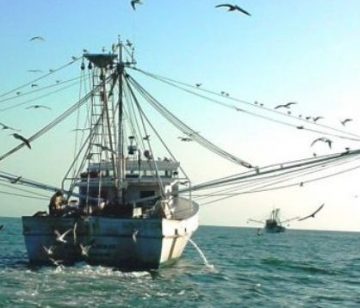 Jimmy Phillips estimates 100,000 pounds or more of shrimp comes through the family seafood market in a season; all of it fresh from North Carolina waters. “Yeah, it worries me,” Phillips said when asked about a petition for rulemaking before the N.C. Marine Fisheries Commission that would put severe restrictions on shrimping in North Carolina. “It would affect shrimping tremendously, net fishing, and everybody,” Phillips said. Phillips is just one of many fishermen, seafood industry representatives, and concerned consumers who plan to attend a Tuesday public meeting in New Bern to express their opposition to the petition. The meeting begins at 12:30 p.m. at the Riverfront Convention Center. Jerry Schill, president of the North Carolina Fisheries Association, a nonprofit trade association representing the interests of commercial fishermen, seafood dealers and processors, said the petition for rulemaking is “not only a referendum on shrimping but a referendum on the future of commercial fishing.” Read the story here 09:34
Jimmy Phillips estimates 100,000 pounds or more of shrimp comes through the family seafood market in a season; all of it fresh from North Carolina waters. “Yeah, it worries me,” Phillips said when asked about a petition for rulemaking before the N.C. Marine Fisheries Commission that would put severe restrictions on shrimping in North Carolina. “It would affect shrimping tremendously, net fishing, and everybody,” Phillips said. Phillips is just one of many fishermen, seafood industry representatives, and concerned consumers who plan to attend a Tuesday public meeting in New Bern to express their opposition to the petition. The meeting begins at 12:30 p.m. at the Riverfront Convention Center. Jerry Schill, president of the North Carolina Fisheries Association, a nonprofit trade association representing the interests of commercial fishermen, seafood dealers and processors, said the petition for rulemaking is “not only a referendum on shrimping but a referendum on the future of commercial fishing.” Read the story here 09:34
Statoil: Fishermen lobby for new spot for proposed Long Island wind farm
 In Joe Gilbert’s view, fishermen like him shouldn’t have to compete with wind farms for a piece of the ocean. “We’re not anti-wind farm,” Gilbert said this past week. “But we don’t want to trade one renewable resource — fish — for another one — wind. They can both exist.” Gilbert is the owner of Empire Fisheries, which has four scallop and squid fishing boats based at the Town Dock. He’s also a member of the board of the Fisheries Survival Fund, one of 12 fishermen groups from New England to New Jersey opposing the federal government’s recent approval of a provisional lease to a Norwegian company that proposes to develop a wind farm on 79,350 acres of ocean bottom about 13 miles south of Jones Beach in Hempstead, Long Island. “What we’re asking is that it be relocated,” said Meghan Lapp, fisheries liaison with Sea Freeze, a squid wholesaler based in North Kingstown, R.I., that has joined the Fisheries Survival Fund in challenging the wind farm plan. The site of the proposed wind farm, fishermen say, is one of the most productive squid and scallop fishing areas in the North Atlantic. But the long trawling nets used by these fisheries could not maneuver within a “pinball machine of structures” that would constitute the wind farm, Lapp said. “It would be too dangerous.” Read the story here 09:01
In Joe Gilbert’s view, fishermen like him shouldn’t have to compete with wind farms for a piece of the ocean. “We’re not anti-wind farm,” Gilbert said this past week. “But we don’t want to trade one renewable resource — fish — for another one — wind. They can both exist.” Gilbert is the owner of Empire Fisheries, which has four scallop and squid fishing boats based at the Town Dock. He’s also a member of the board of the Fisheries Survival Fund, one of 12 fishermen groups from New England to New Jersey opposing the federal government’s recent approval of a provisional lease to a Norwegian company that proposes to develop a wind farm on 79,350 acres of ocean bottom about 13 miles south of Jones Beach in Hempstead, Long Island. “What we’re asking is that it be relocated,” said Meghan Lapp, fisheries liaison with Sea Freeze, a squid wholesaler based in North Kingstown, R.I., that has joined the Fisheries Survival Fund in challenging the wind farm plan. The site of the proposed wind farm, fishermen say, is one of the most productive squid and scallop fishing areas in the North Atlantic. But the long trawling nets used by these fisheries could not maneuver within a “pinball machine of structures” that would constitute the wind farm, Lapp said. “It would be too dangerous.” Read the story here 09:01
Washington adopts Columbia River salmon fishing reforms
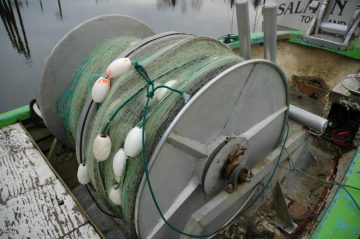 The Washington Fish and Wildlife Commission agreed here Saturday to implement in 2017 the most sweeping lower Columbia River salmon fishing reforms in decades, including the elimination of gillnets in the main stem of the river during spring and summer. By a 7-2 vote, the commission decided to go ahead with implementation this year of reforms first adopted in early 2013 and phased in during a four-year transition period. Oregon’s Fish and Wildlife Commission will address the issue Friday, and there are indications it might not agree with Washington’s position. In a nutshell, the reforms allocate more chinook salmon to sportsmen in the main Columbia and restrict gillnetting to off-channel sites like Youngs Bay, Tongue Point and Blind Slough near Astoria. The reforms also call for any commercial fishing that remains in the main lower Columbia to be done with live-capture methods — such as purse seines and beach seines — designed to harvest hatchery stocks and release wild fish. Read the story here 08:14
The Washington Fish and Wildlife Commission agreed here Saturday to implement in 2017 the most sweeping lower Columbia River salmon fishing reforms in decades, including the elimination of gillnets in the main stem of the river during spring and summer. By a 7-2 vote, the commission decided to go ahead with implementation this year of reforms first adopted in early 2013 and phased in during a four-year transition period. Oregon’s Fish and Wildlife Commission will address the issue Friday, and there are indications it might not agree with Washington’s position. In a nutshell, the reforms allocate more chinook salmon to sportsmen in the main Columbia and restrict gillnetting to off-channel sites like Youngs Bay, Tongue Point and Blind Slough near Astoria. The reforms also call for any commercial fishing that remains in the main lower Columbia to be done with live-capture methods — such as purse seines and beach seines — designed to harvest hatchery stocks and release wild fish. Read the story here 08:14

































